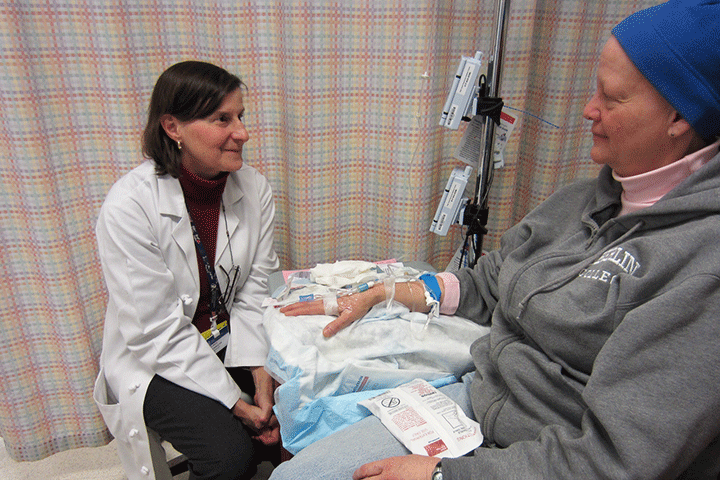Summer Safety for Pancreatic Cancer Patients

Sure, summer is full of fun, travel, and play, but it’s also packed with potential health hazards, particularly if you have pancreatic cancer.
In fact, scorching temps come with a host of side effects, ranging from sunburn to heat-related illness. Pancreatic cancer patients face additional health risks, since extreme heat can exacerbate side effects of treatment.
“Cancer patients may be especially sensitive to the sun, and they may have trouble regulating their body temperature,” says Debbie Soldano, Nurse Practitioner and Pancreatic Cancer Patient Coordinator at UC San Diego Health‘s Moores Cancer Center.
To help you get through summer unscathed, we’ve got easy solutions for the most common summer safety traps.
Potential Hazards
Dehydration
Staying hydrated can be a challenge for cancer patients, even when temperatures are mild. Maybe your taste buds have taken a hit from chemotherapy. Or maybe nausea and digestive drama keep you from eating and drinking regularly. Add in medication-induced diarrhea and extreme heat, and it’s no wonder many pancreatic cancer patients fall short of meeting their daily water quota.
According to Soldano, patients who get a Whipple procedure often have a poor appetite and may struggle to take in enough food and water. “They feel full even sipping small amounts of fluids,” she says. But getting sufficient fluids helps your blood transport nutrients and oxygen throughout the body and helps flush out toxins and prevent kidney damage, so it’s important.
Easy answer: Stay out of the heat, especially during exercise, and drink plenty of fluids (two liters daily is a good rule of thumb). Steer clear of alcoholic beverages and caffeine, both of which can worsen dehydration. And load up on water-rich produce, such as cucumbers, celery, lettuce, watermelon, cantaloupe, peaches, and grapes. Most important, pay attention to the signs of dehydration:
- Dark-colored urine
- Fatigue
- Dizziness
- Headache
- Dry or cracked lips and/or skin
Increased Risk of Infection
Chemotherapy causes your white blood cell count to take a nosedive, which makes you more vulnerable to everything from foodborne disease to waterborne bacteria. Swimming in public spaces, picnicking outdoors, and traveling by plane or train can pose a threat to pancreatic cancer patients who are suffering from already weakened immune systems. Radiation therapy can cause problems, too, making your skin more sensitive to chemicals used in pool water.
Easy answer: In general, it’s best to avoid swimming in public pools, ponds, and lakes (bacteria thrive in warm waters), especially if you have any breaks in the skin. Even the ocean can harbor waterborne bacteria. To prevent foodborne disease, bring your own meals, store them at appropriate temps, and don’t share utensils with other people.
Vacationing over summer break? Ask your doctor if you should wear a mask and try to maintain physical distance between you and other passengers while traveling.
Overheating
If you’re exposed to high temperatures, your body may have trouble cooling off. Spending a lot of time in the heat can also lead to overwhelming fatigue. “The sun dilates blood vessels, and that increases your metabolism,” Soldano says. In other words, your body works hard at keeping you cool.
And, while experts agree that exercise can improve outcomes for pancreatic cancer patients, it’s important to bring activities indoors during daylight hours to reduce the risk of overheating.
Easy answer: Stay out of the heat, especially when exercising. Drink plenty of fluids to help you dispel body heat effectively. Wear breathable fabrics that help wick away sweat. And if you’ve lost your hair, consider a chemo cap instead of a wig.
Unfortunately, the following warning signs of heat exhaustion and heat stroke overlap with the side effects of cancer treatment, so it’s critical to remain vigilant:
- Headaches
- Nausea and vomiting
- Dizziness
- Constipation
- Fatigue
- Pale, clammy skin
Sun Sensitivity
Certain forms of treatment, including chemotherapy, radiation, and targeted therapies, can increase sun sensitivity. “Even some of the medications patients take to prevent side effects, like Zofran and dexamethasone, can make skin more vulnerable to the sun,” Soldano explains.
Systemic therapies affect the whole body and can cause skin reactions everywhere. Radiation treatment is targeted to specific locations, so only those areas of the body may be sun sensitive. Surgical scars are also susceptible to sun damage.
Easy answer: Whether you’re undergoing cancer treatment or not, you should always slather on broad-spectrum sunscreen with an SPF of 30 or more. You can also purchase sun-protective clothing.
If you’re in active treatment, try to stay in the shade between the hours of 10 a.m. and 4 p.m., when the sun’s rays are strongest—and wear a wide-brimmed hat, sunglasses, and light clothing when you’re outdoors.
“If you’re limiting your exposure to the sun, ask your doctor to test your vitamin D levels,” Soldano suggests. “Vitamin D plays an important role in immune function, and vitamin D deficiency has been linked to certain chronic illnesses.”
Undergoing cancer treatment challenges both body and mind. Plus, medications like chemotherapy can stay in your system for four to six weeks after your last infusion. So it’s especially important to listen to your body when it comes to head and sun exposure.
There are simple preventive steps you can take to avoid summertime hazards, but “if something feels off, don’t hesitate to contact your doctor,” Soldano says. Sometimes all you need is some intravenous hydration to get going again. But if you do get struck with foodborne or heat-related illness, or some other summertime woe, seeking medical care can help.





